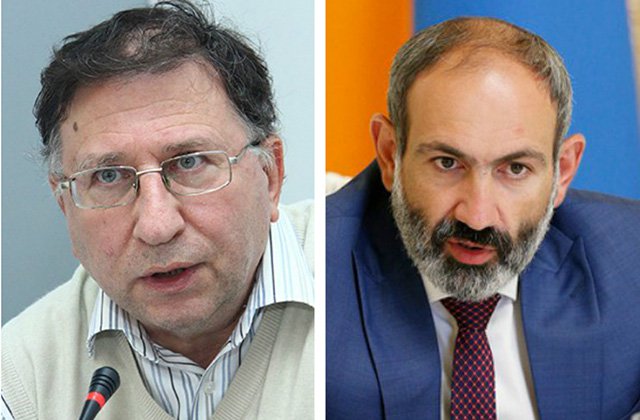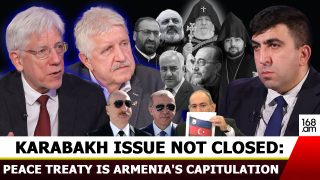“I’ve said it before, and I’ll say it again — it was misuse of administrative resources” – Varuzhan Hoktanyan publishes the international standards upon Nikol Pashinyan’s demand

Project Director of Transparency International Anti-Corruption Center Varuzhan Hoktanyan recently declared that, according to international standards, the regional visits of Nikol Pashinyan during the pre-election period is misuse of administrative resources. However, Nikol Pashinyan does not think so. “What does ‘international standard’ mean? Does this mean that the Acting Prime Minister of the Republic of Armenia should not leave the office?” Pashinyan declared, demanding that the international standards be published.
In an interview with 168.am, Project Director of Transparency International Anti-Corruption Center Varuzhan Hoktanyan presented the international documents based on which he had made such a statement.
“First, there is the 1990 OSCE Copenhagen Document, Paragraph 5.4 of which states that there has to be “a clear separation between the State and political parties; in particular, political parties will not be merged with the State”. Later, this served as a basis for the definition of misuse of state (administrative) resources during elections. Misuse of administrative resources during elections is misuse of public (state, community) resources by the ruling political parties or candidates in order to have an unsubstantiated advantage during elections. Ruling political parties already have an advantage from the perspective of the use of administrative resources (because only they can possess such resources), and this is why it is accepted to distinguish between use of administrative resources and misuse of administrative resources,” Hoktanyan clarified.
Varuzhan Hoktanyan also made a reference to Section G of Chapter 2 of the OSCE/ODIHR Handbook for the Observation of Campaign Finance (Handbook for the Observation of Campaign Finance. @OSCE/ODIHR 2015. ISBN 978-92-9234-903-5, pp. 22-23), which is devoted to misuse of administrative resources.
“Section G of Chapter 2 particularly states the following: “Common problems that may be observed include the use of government offices or vehicles for campaigning and the campaigning of public sector employees during work hours”.
This was the main problem here. I took as a basis the fact that public sector employees and employees of state institutions attended the opening of a school in Martuni during work hours, and after listening to what Pashinyan said during the opening ceremony, I can state that there was also campaigning. I am placing the main emphasis on the fact that the event took place during work hours. I have said it before, and I will say it again — this specific episode was misuse of administrative resources.
Yesterday, the Central Electoral Commission (CEC) published a clarification stating that the Electoral Code does not contain any regulation with respect to periods that are not within the period of the election campaign (26 November-7 December); therefore, whatever is done before the specified period shall not be observed as campaigning.”
The CEC clarifies that the RA Electoral Code defines a specific period referred to as the period of pre-election campaign and to which the rules defined by the Electoral Code apply.
“The period of pre-election campaign for the snap elections of the National Assembly scheduled for 9 December 2018 starts on 26 November and ends on 7 December. This is exactly the period during which the rules defined by the Electoral Code for use of public resources, campaigning and ensuring of financial transparency apply in order to ensure equal opportunities for political parties and candidates running in the elections,” the statement reads.
At the same time, as Varuzhan Hoktanyan stated, according to the internationally accepted good practices, there should not be misuse of administrative resources before the period of pre-election campaign prescribed by law, including prior to the launch of the official campaign, starting from the day of promulgation of the legal act on holding elections (in Armenia’s case — the decree of the RA President).
Hoktanyan said that even though Armenian legislation does not define the concept of “misuse of administrative resources”, according to the above-mentioned international standards, Pashinyan’s regional visits during the pre-election period can be observed as misuse of administrative resources, if Pashinyan has campaigned during work hours in the course of those visits.
“I will not be surprised to find out that the working day of the Prime Minister is not regulated and that he can campaign whenever he wants. The march held today is on a Saturday, meaning that it cannot be observed as misuse of state resources.”
As far as the already placed pre-election posters are concerned, Hoktanyan said there is no misuse of administrative resources there.
“There is a financial monitoring handbook for pre-election campaigns for NGOs, and there are examples of misuse of administrative resources on the part of institutions on page 98. Among those examples are campaigning during work hours, use of government vehicles for campaign and more. The book also states campaigning during events not linked to elections. Pashinyan can say this is not the case, but this is my opinion. Anti-campaign is also a type of campaign. During their years in power, some members of the Republican Party of Armenia would say that people don’t have to vote for the Republican Party of Armenia, but this should not be said directly or by spattering other political parties,” Varuzhan Hoktanyan noted.
“When the Civil Contract Party was an opposition party and Transparency International would speak out about this, the political party would encourage Transparency International and tell us that there should not be campaigning during work hours,” Hoktanyan emphasized.
Touching upon the issue of whether the Acting Prime Minister is obliged to be on leave starting from the launch of the official campaign until the end of the campaign, Chief of Staff of the RA Prime Minister Eduard Aghajanyan said that the RA President, Deputies of the National Assembly and government officials can combine campaigning and the performance of their official duties during the pre-election period.
However, making a reference to the OSCE/ODIHR Handbook for the Observation of Campaign Finance (see page 22), Varuzhan Hoktanyan stated that manifestations of misuse of administrative resources could be prevented, if the Acting Prime Minister and other officials were on leave.
By Razmik Martirosyan

























